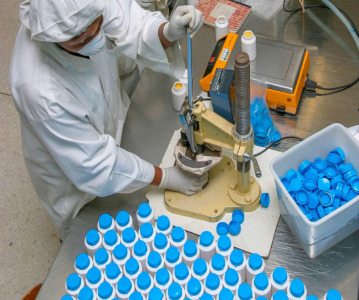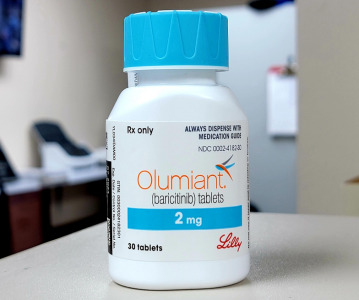Biologics & biosimilars: Drug delivery innovation is finally here

Pushpa Vijayaraghavan Director, Healthcare & Lifesciences Practice, Sathguru Management Consultants
Biologics, for the most part, have been accepted as injectable drugs delivered in a hospital setting. Self-administration devices have become common pursuit within the realm of diabetes (primary GLP1 analogues that are peptides and insulins) and CNS drugs. However, oncology drugs that are the largest bastion within biologics have remain largely bereft of delivery innovation. Often delivered as an infusion in a hospital or clinic setting, patient convenience has not been a key consideration driving oncology innovation. While certain dose limiting side effects have been addressed to enhance clinical outcomes and justify premium reimbursement, patient convenience standalone has been relegated to insignificance.
The trend is true of both novel biologics and biosimilars. In the case of biosimilars, regulatory ambiguity and the consequent impact on the business case resulted in retracting of early efforts to create ‘bio-betters’. With interchangeability not designated by the US Food and Drug Administration even for any biosimilar approved to date, the regulatory pathway for an improved formulation of a biologic has been unclear. The 505(b)(2) regulatory pathway has served as substantial impetus for drug delivery innovation in approved small molecule drugs. A parallel pathway for biologics remains undefined. In the absence of a regulatory pathway that implies capital efficient clinical development and negates the need for detailing / sales efforts, RoI has been elusive for investments in bio-betters.
While the world continues to be submerged under the weight of the COVID-19 pandemic that continues unabated, these headwinds have somewhat receded. Two critical developments are testimony to the evolving dynamic:
FDA’s approval of sub-cutaneous formulation of trastuzumab and pertuzumab combination:
In July 2020, while the pandemic was continuing the peak, the FDA responded with agility to accelerate approval of formulations rendered more valuable by unanticipated constraints. One of the critical developments was approval of Genentech’s (Roche’s subsidiary) Phesgo four months before the FDA goal date. Our PharmForward update provides more details on this milestone approval. Phesgo is a combination of two biological drugs, Herceptin (trastuzumab) and Perjeta (pertuzumab) along with hyaluronidase and is indicated for use in HER-2 positive breast cancer patients. Normally a sequential administration through intravenous (IV) infusion takes about 150 minutes for a loading dose of Perjeta and Herceptin and about 60 to 150 minutes for subsequent maintenance infusions. Phesgo, on the other hand takes 8 minutes for the first dose to be administered and 5 minutes for subsequent maintenance doses.
One of the few silver clouds of the COVID-19 pandemic is the long overdue focus on self-administration and home administration in biologics for oncology indications. This also triggers greater momentum around life cycle management in innovator biologics with high level of market erosion threat from biosimilars.
Celltrion’s EMA win for subcutaneous infliximab and push towards oral formulation:
The biosimilar landscape for improved formulations has been positionally changed in 2020. Celltrion has paved the way for milestone developments that will serve as critical precedents for other companies and products. The erstwhile context of poor business case for biobetters could stand questioned by the trajectory that Celltrion’s infliximab takes. In July 2020, we had discussed in our PharmForward update that Celltrion had obtained EMA’s nod for its subcutaneous infliximab for five new indications. Celltrion’s product that is available as a pre-filled syringe or pen is the first biosimilar in the subcutaneous format. In the EU, Celltrion pursued for an extension of marketing authorization for its intravenous Remsima product with support of additional clinical data. In the US, Celltrion will likely have to go through a 351(a) biologic application for its subcutaneous version since currently there’s no reference subcutaneous product.
Taking a further leap, in August 2020, Celltrion announced a partnership to develop an oral infliximab (details in our PharmForward update). If developed and approved, this will be the first ever oral formulation of infliximab and one of the few oral formulations of biological drugs.
Implications of these milestone developments:
While spread of COVID-19 continues unabated globally, it has laid bare the urgent and imminent need to ensure biological drugs can be administered easily, at home, and as far as possible, by the patients themselves. Immune compromised cancer patients cannot wait for the pandemic to be behind us to receive essential care. But even in indications such as rheumatoid arthritis, ease of administration is now recognized as important. It is encouraging to note this renewed focus on drug delivery in biologicals extend across novel biologicals and biosimilars. Celltrion’s efforts also pivot biosimilar companies way forward in the value chain. A journey that commences with bioequivalent solutions can now aspire to deliver next generation therapeutics.
While the directional impetus is highly encouraging, the challenge is not an easy one to conquer. Oral, transdermal and inhaled insulins are testimony to the several corporate pursuits that have not led to solutions with potential for widescale clinical impact. While we pursue the lofty goals of avoiding the needle, near to mid-term opportunity is concentrated in developing convenient solutions for self-administration. Substantial opportunity for impact on patient lives, but one that calls for high level of collaborative solutioning between drug developers/biosimilar devloeprs and device companies. Formulation, device and ease of use – time for biologics drug delivery to embrace the opportunity at the convergence of all three
Related News
-
News Women in Pharma: Moving beyond discussions and into best practice at CPHI Milan
In this second CPHI Milan special of our monthly series, we cover the key takeaways from the Diversity & Wellbeing track held on October 10, 2024. -
News AstraZeneca invests in AI collaboration for cancer drug trials
The British-Swedish pharmaceutical giant is partnering with biotechnology firm Immunai Inc to increase the efficiency of some cancer drug trials. -
News Ozempic and Wegovy prices questioned as Novo Nordisk faces US Senate hearing
The CEO of Novo Nordisk was grilled during a US Senate committee hearing on September 24, 2024, in which the exorbitant prices of the Danish company’s blockbuster drugs Ozempic and Wegovy were called into question. -
News The BIOSECURE Act: implications for the pharma supply chain
On September 9, 2024, the US House of Representatives voted to pass the bill titled the BIOSECURE Act (the Act), which lists several Chinese companies in the pharmaceutical supply chain. The Act will prohibit American companies from contracting or doin... -
News On Track at CPHI Milan: Thermo Fisher Scientific Track Sponsor interview
With CPHI Milan just around the corner, we sat down with some of the sponsors for this year’s conference tracks to discuss the most pressing topics in pharma. -
News CPHI Milan Speaker Spotlight: Pharma Manufacturing and Localisation in Africa
In the run-up to CPHI Milan, we sit down with some of the experts and thought-leaders speaking at this year’s conferences. -
News US BIOSECURE Act passed by US House of Representatives
The controversial act, which has already impacted several foreign companies operating in the US, was passed by the House of Representatives on September 9, 2024. It is now headed for the US Senate before it can be signed into law by President Joe Biden... -
News Eli Lilly licenses rheumatoid arthritis manufacturing in Africa
American pharmaceutical company Eli Lilly has signed a partnership with Egyptian organisation Eva Pharma to localise manufacturing of rheumatoid arthritis treatments in Africa.
Recently Visited
Position your company at the heart of the global Pharma industry with a CPHI Online membership
-
Your products and solutions visible to thousands of visitors within the largest Pharma marketplace
-
Generate high-quality, engaged leads for your business, all year round
-
Promote your business as the industry’s thought-leader by hosting your reports, brochures and videos within your profile
-
Your company’s profile boosted at all participating CPHI events
-
An easy-to-use platform with a detailed dashboard showing your leads and performance

.png)





